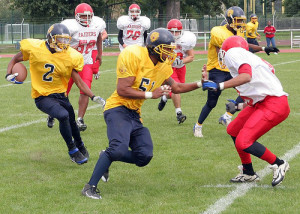
Implementing a competitive high school sports program is proven to have positive psychological and physical benefits for students. Here are some of the ways creating more competition in your football program can help your players.
-
Understanding the Importance of Hard Work
Kirk Mango introduced the CDSPH Principle in his book, Becoming a True Champion. This principle refers to the skills that athletes can learn in competitive sports: commitment, discipline, sacrifice, priorities, and heart. These strengths are necessary for success in both sports as well as life in general and, unfortunately, are not always part of standard school curriculums. This makes the lessons learned on the field even more important.
-
Improving the Quality of Football at Your School
Enhancing competition is a sure way to improve the quality of football at your school. A more competitive team leads to more wins, which help attract stronger players to your program. Improvements will also bring in more revenue through local business and fan support, allowing for upgraded equipment and development programs for coaches.
-
Learning to Represent a Community
Competitive sports allow students to understand what it is like to represent a community—and why it matters. Your players are brand representatives of your team, school, and of you as a coach. How they present themselves—on and off the field—influences how others support your football program and school. Likewise, when your players have worked hard and take pride in what they have built together, they are more likely to value and defend it.
-
Understanding the Value of Teamwork
The ability to work effectively as a team is greatly enhanced in a competitive football program. Players who work together toward a common goal see how their performance contributes to the success (or failure) of the team. Being part of a team also gives students the opportunity to find their place, either as a leader or in a supporting role—both of which are necessary on any successful team. form bonds and learn to deal with stress collectively, which in turn creates a more cohesive and impressive game.
-
Improving Academics
Don’t buy into the stereotype that athletes can’t also be good students. In 2007, the Minnesota State High School league conducted a survey and found that students involved in athletic programs had a notably higher average GPA than students who did not participate in sports. The survey also found that athletes missed fewer school days.
-
Preparing for Competitive Sports Beyond High School
After high school, some of your football players will advance to college teams, and perhaps even the professional arena. The training requirements at the college and pro levels are much more intense than anything they will have experienced. The skills they learn from you above and beyond the technical plays—time management, persistence, the value of practice, and the importance of teamwork—go a long way toward preparing them for their future as an athlete, and their future in the working world in general.
-
Developing a Mindset for Success
As a coach, you push your players to work hard because you know hard work pays off on the field, in the classroom, and in life. Team members learn that winning doesn’t just happen—it is achieved through practice, persistence, and a commitment to constant improvement. As your players improve individually and as a team, they see evidence that the harder (and smarter) they work, the better they perform. The life lessons learned from competitive sports will help your players long after the high school years, helping them succeed in college, advance in their careers, become active members of their communities, and achieve personal goals.
The benefits of a more competitive football program certainly aren’t limited to the seven presented here. As a coach, where do you see your players most impacted by more competition? We’d love to hear your thoughts.
photo credit: HHS vs. KHS via photopin (license)

